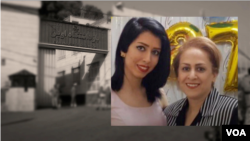Iran has made the imprisonment of a mother and her daughter who campaigned against its compulsory public veiling of women harsher – denying the daughter medical care and refusing to grant her mother a furlough for no apparent reason, according to an informed source.
The source spoke to VOA Persian in an Oct. 16 interview from Iran, describing several recent examples of authorities at Tehran’s Evin prison engaging in harsh treatment of 22-year-old activist Saba Kord Afshari and her mother, Raheleh Ahmadi. VOA is unable to independently verify the source’s account due to being barred from reporting inside Iran.
The source said that while Iranian authorities allowed Kord Afshari to be hospitalized for serious ailments three times in recent months, they prevented her from getting the treatment that she needed before she was returned to Evin.
London-based rights group Amnesty International has said Iranian authorities forced Kord Afshari to wait a year after her June 2019 arrest before allowing her to make her first hospital visit on June 29 for preexisting gastrointestinal problems that have been exacerbated in prison.
Amnesty said the doctor failed to conduct a comprehensive examination of Kord Afshari and referred her for future colonoscopy, endoscopy and ultrasound procedures.
But VOA’s source said Kord Afshari was told that she cannot have those procedures because of her late hospital arrival and her lack of money to make payments. As a result, Kord Afshari’s health problems have worsened since she was transferred to Evin in August 2019, the source added.
Dublin-based rights group Front Line Defenders has said the regulations of Iran’s Organization of Prisons stipulate that medical expenses of prisoners should be paid by the government. The group also said that when authorities granted Kord Afshari a Sept. 19 hospital visit, they misled her family by saying she was in a different hospital to ensure that relatives would not meet her and pay for her treatment.
Saba Kord Afshari’s sister Sogand reported on Twitter that Saba had been hospitalized again in late September for an ankle injury but was sent back to Evin without an MRI examination and with only a cast on her leg. Sogand said when Saba was not granted a follow-up appointment at the hospital two weeks later, she opened the cast herself and saw that her foot was swollen and bruised.
VOA’s source said Kord Afshari’s lawyer Hosein Taj also has escalated his fight to restore the activist’s November 2019 acquittal by an appellate court for the charge of “inciting and facilitating corruption and prostitution” through promoting “unveiling.”
A lower court initially convicted Kord Afshari in August 2019 of that charge and two others — “gathering and conspiring against national security” and spreading anti-government propaganda — for removing her hijab in public as part of a women’s right’s campaign against Islamist-ruled Iran’s compulsory public veiling laws for women.
The lower court sentenced Kord Afshari to 15 years in prison for “corruption and prostitution,” 7.5 years for “gathering and conspiring” and 1.5 years for spreading propaganda. The appellate court later acquitted her of the corruption and prostitution charge, meaning she would only have to serve the longest remaining sentence, 7.5 years.
But Taj said in a May tweet that he discovered Iran’s judiciary had inexplicably restored his client’s corruption and prostitution conviction, meaning that she would have to serve 15 years in prison rather than 7.5 years.
VOA’s source said Taj petitioned Iran’s Supreme Court in late September to restore Kord Afshari’s acquittal and was awaiting a response.
Mother denied furlough
Raheleh Ahmadi, Saba Kord Afshari’s mother, was arrested in July 2019 and detained for several days for advocating on behalf of her daughter. Ahmadi later was sentenced to two years and seven months in prison for national security offenses and began serving her sentence at Evin on Feb. 20.
In March, Iran said it granted temporary releases or furloughs to tens of thousands of prisoners serving five years in prison or less, in part to curb the spread of the coronavirus in its overcrowded and unsanitary jails.
According to VOA’s source, Ahmadi has not been granted a furlough since her imprisonment, despite qualifying for one by serving a less-than-five-year sentence. Family members of Ahmadi and her jailed daughter repeatedly have asked Evin’s prosecutor to grant furloughs to the two women, but the appeals have been rejected, the source added.
“When a mother is kept in prison with her sick child, and sees that her child cannot eat due to a gastrointestinal illness, she is in torment,” the source said. “The authorities just want to inflict psychological torture on political prisoners and their family members.”
There has been no comment from Iranian officials in state media about the cases of the two women since May, when reports confirmed that Kord Afshari’s acquittal had been canceled.
Kord Afshari previously was arrested in August 2018 for joining anti-government street protests and later sentenced to one year in prison for allegedly disrupting public order. Authorities released her in February 2019 as part of a general pardon marking the 40th anniversary of Iran’s 1979 Islamic Revolution, before re-arresting her in June that year.
This article originated in VOA’s Persian Service. Click here for the original Persian version of the story.




